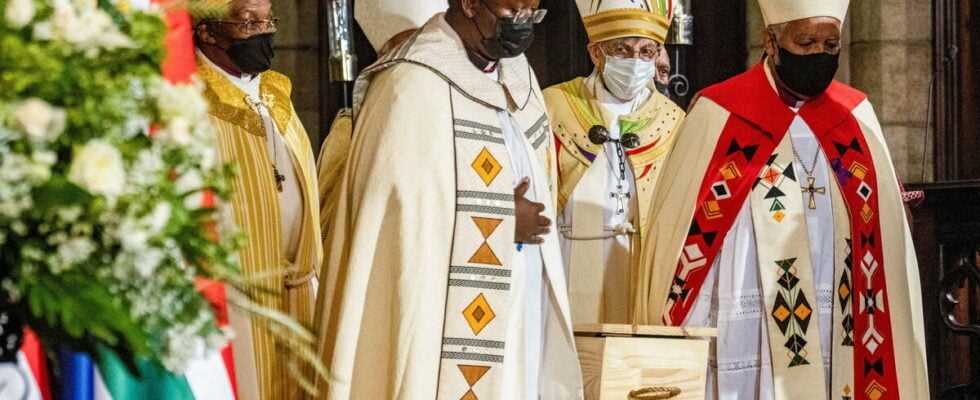The national funeral, but marked by simplicity according to his wishes, of the last great hero of the fight against apartheid took place on Saturday in Cape Town, in his parish. Thousands of people had flocked over the past two days to greet the remains of the one who “raised the morale of South Africa”.
Bells are ringing. A page of history has just been turned. The funeral of Desmond Tutu, the latest icon in the anti-apartheid struggle, was held this Saturday in Saint George’s Cathedral in Cape Town. A symbolic place, since it is there that he officiated for a decade, the first black Anglican archbishop, and, from this square, that he led numerous marches and campaigns, slayer of the racist regime.
“Of small physical stature, he was a giant among us, morally and spiritually”said Bishop Michael Nuttall, a longtime friend of Desmond Tutu, who celebrated mass. Nuttal was his deputy, white, when Tutu was appointed the first black archbishop. In his sermon, he celebrated his life, his generosity, his struggle and his convictions that made “Everything he defended was guided by a spirit of mercy towards everyone”.
“A rainbow emerging from the shadow of apartheid”
Due to measures related to the Covid-19 pandemic, only 100 people had been allowed inside the church. Mainly family members, friends and representatives of the clergy. Some distinguished guests were present: the former President of Ireland, Mary Robinson, the King of Lesotho Letsie III, the widow of Frederik de Klerk, the last white president of the country who died on November 11, Graça Machel, widow of Nelson Mandela , Thabo Mbeki, former president who had succeeded him and whom Tutu did not hesitate to criticize for his inaction in the face of the HIV pandemic and the current head of state, Cyril Ramaphosa, who read the eulogy. “Bishop Desmond Tutu was our moral compass, but he was also our national conscience, he said. Even after the advent of democracy, he did not hesitate to call attention, often harshly, to our shortcomings as leaders of this democratic state. He saw our country as a rainbow emerging from the shadow of apartheid, united in its diversity, with freedom and equal rights for all ”.
Desmond Tutu, who died on December 26, was entitled to the honors of a state funeral. But he wanted them modest, in his image. He had given very specific instructions in this regard. No fanfare, no flowers, only a small bouquet of white carnations, offered by the family, placed on an unadorned pine coffin. He had also chosen the passage of the Gospel according to Saint John which would be read. A command from Jesus to his disciples at their last meal: “Love one another, as I have loved you”.
During his lifetime, Desmond Tutu, Nobel Peace Prize winner in 1984, believed that it was impossible to remain neutral in the face of injustice. While most of the leaders of the anti-apartheid struggle – the policy of racial segregation and discrimination enforced by the white minority government against the black majority in South Africa from 1948 to 1991 – were imprisoned or in exile, he resumed the torch of resistance against tyranny and oppression. He was a pacifist, but determined and courageous. On several occasions, he threw his slender figure in front of the police, or in the midst of angry crowds to prevent the lynching of suspected informants, opposed to any form of violence.
“Icon of our history”
He supported many causes afterwards, fought many battles, always talkative, always honest. He was also, until the end, a unifier. A rare trait, as divisions and resentments remain in South Africa. “We are still looking for our balance in the long road to a national feeling, said President Ramaphosa. He always kept hope ”.
During the two days preceding the archbishop’s funeral, thousands of people, whites, blacks, of all ages, came to meditate one last time at Saint George’s Cathedral, in front of his remains. “We are here to pay tribute to a man who was courageous, in difficult times, said Thoko Judah, in her thirties, accompanied by her husband. He was a real leader, he represented honesty. It is an icon of our history who has passed away ”. Many had come as a family. “He first followed in his father’s footsteps in teaching. But he abandoned this career after the Bantu education law in 1973. (which imposed racial segregation in all educational establishments, including universities, editor’s note)… Do you know what this law is? No ?”, asks a mother of her three children. Silence. “It shows how much they grow up in a different time, but they have to know their roots, she says. They must know their history, they must be aware of the struggles to get there! ”
A condolence book had been made available to the public. Many visitors stopped to leave a note. “I wrote… Thank you very much for being the one to cheer up South Africa”, relates Tsepho Mashile, who remembers seeing Desmond Tutu for the first time during one of his speeches, when she was 4 years old. “He was the most dynamic, the most smiling man. I think that in a country like ours, where there is a lot of cynicism, of wounds, it was great to have someone with such energy ”.
His empathy, his contagious laughter will leave a void. The ashes of Desmond Tutu will rest inside the cathedral. On Saturday, as the funeral procession moved away, the sky over Cape Town, which had been crying for the two-hour ceremony, brightened. But no rainbow formed there. Some will see it as a sign that the dream Desmond Tutu has carried at arm’s length all his life will have to be pursued by others.
